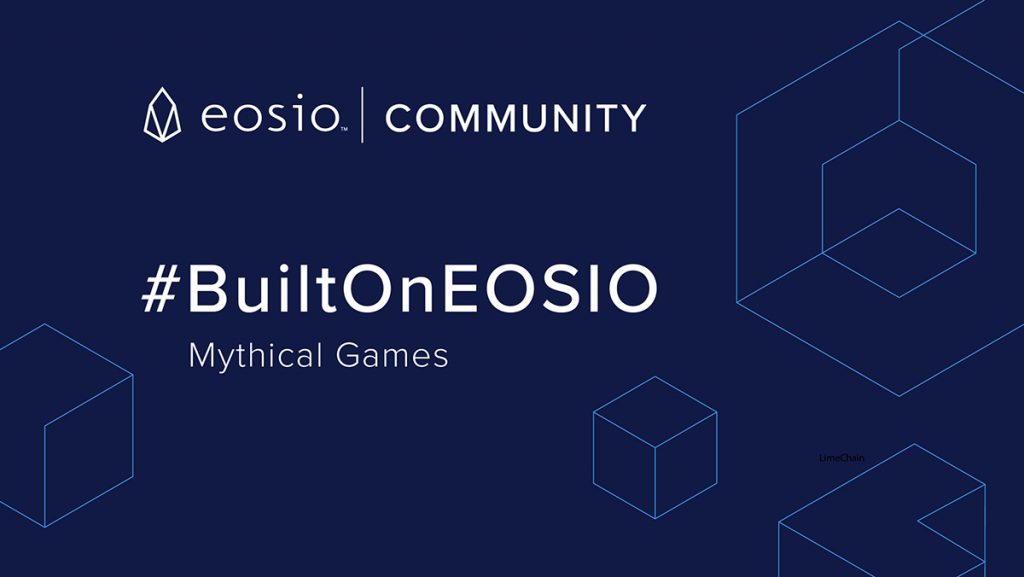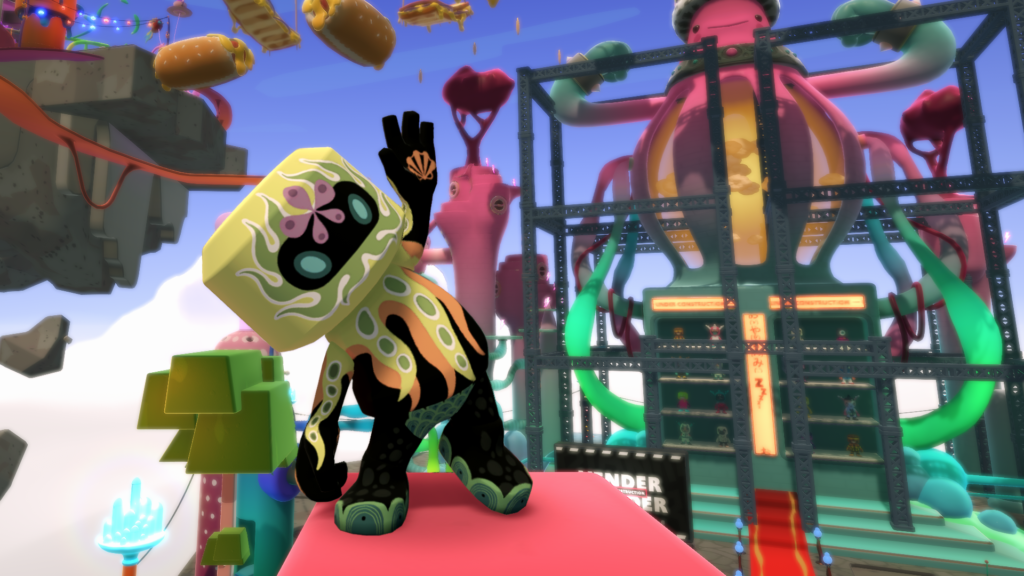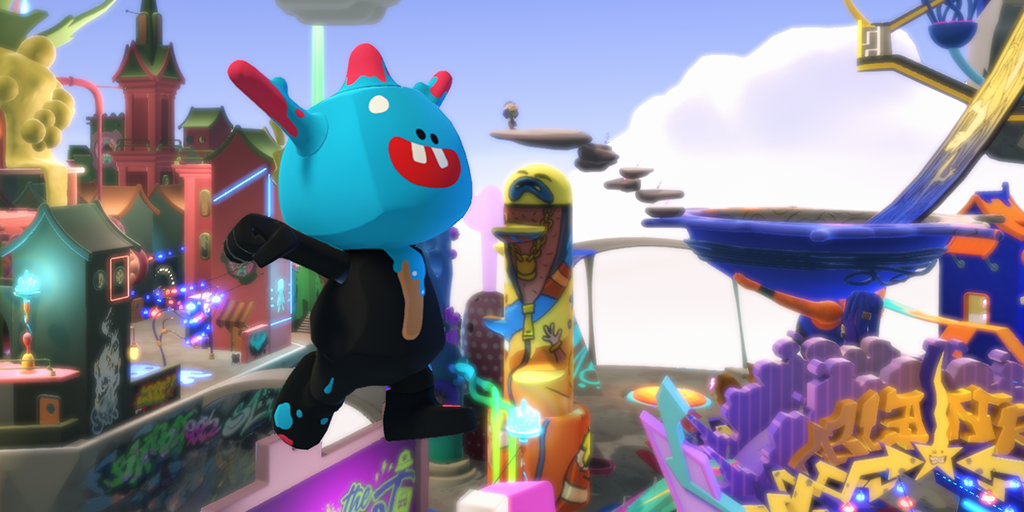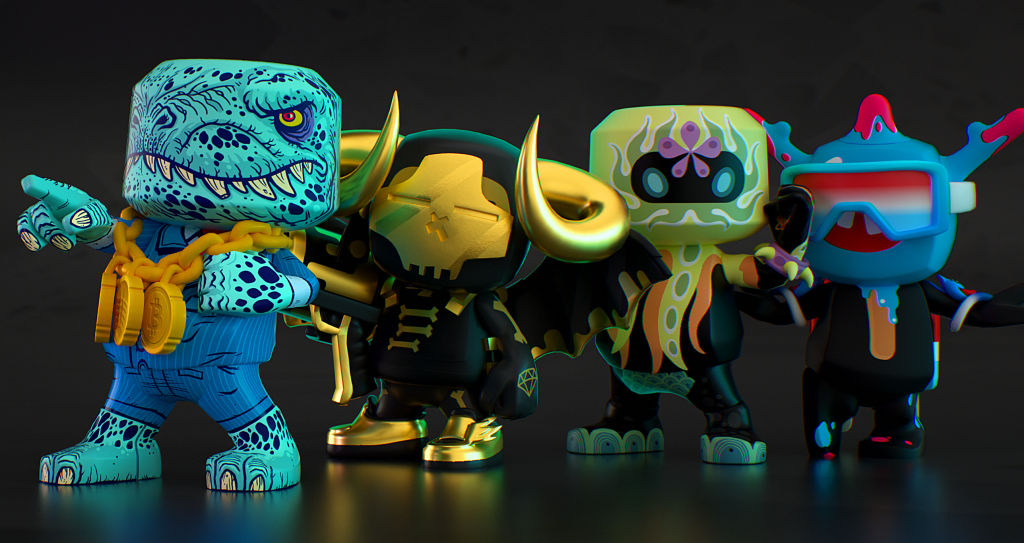Gimly’s Decentralized Identity Framework Is Built for Portability and Security
Gimly built a decentralized identify framework on EOSIO that offers users portability, security, and ease.

Mythical Games is a Galaxy EOS VC Fund funded company that has been working steadfastly for the last 18 months on its release of Blankos Block Party, an open-world multiplayer game built on EOSIO. Founded in 2018, Mythical Games emerged at a time when players were beginning to experiment with the notions of blockchain-based digital ownership.
Mythical Games Co-founder and SVP of Business Development Rudy Koch is no stranger to the gaming industry. For many years, he’s worked on AAA blockbuster titles including World of Warcraft (WoW), several Call of Duty (CoD) games, and free-to-play pioneer Club Penguin. At Mythical he joins a team of veteran game developers, all of whom share an extensive background creating some of the biggest games in the world.
“We got really excited about ways we could leverage blockchain to challenge the way game economies were being designed,” explains Rudy. “We saw a natural fit with what blockchain was introducing and with where the games industry was going.”
Mythical arrived in the blockchain space with a mission to leverage mass-market game development expertise to build games that people want to play. Rudy believes this is the best approach to the mass adoption of blockchain-based platforms. The first game from Mythical is Blankos Block Party, an open-world multiplayer game built on EOSIO.

In Blankos Block Party, players control avatars inspired by vinyl toys. “One of the things about vinyl toys that we latched onto was that collectability, scarcity and variety are concepts that are already built into the physical vinyl toy industry.”
Rudy describes Blankos’ gameplay as immersive. “Players can compete against each other in minigames in this open world stylized after a giant street block party. Each player-owned block is highly customizable, and they can create their own racing, collecting and shooting minigames to share with friends and the wider community.”
In particular, Rudy is excited about giving players the ability to build their own Blankos levels, providing a dynamic range of ways for people to engage with the game.
“Players are incredibly creative and sophisticated. Given the right tools, they do things that we couldn’t possibly imagine. I’m excited to see what they do because giving players the ability to build their own minigames is going to allow for an extremely rich, diverse and ever-changing experience for our community.”
Blankos creates a player-owned asset economy and gives gamers a way to compete and interact with one another. It leverages EOSIO to create blockchain-based assets for in-game items, such as skins, accessories, emotes, and other cosmetics. Unlike classic games where assets exist solely on the game server, players actually own these tokenized assets in the world of Blankos, and they can buy or sell their Blankos assets at their own discretion in a secondary marketplace.
Mythical is also working with a group of artists to generate a wide range of styles. “What we end up with is an economy that has a whole bunch of flavors for all kinds of tastes. All of these items are stored on the EOSIO blockchain to help facilitate interesting and unique economic concepts.”
“From there, we can lean into the concept of true ownership by facilitating things like secondary markets, where players can sell items to each other. The result creates some unique new opportunities for monetization and revenue for players and content creators.”
Rudy sees modern players as more sophisticated and enterprising than they ever have been, making them eager to participate in digital commerce. “Letting players get involved and potentially make money, but also allowing content creators, artists, and brands to get involved as well, creates an inclusive economy where everyone gets to participate. And this is all made possible because of EOSIO, which is the backbone of these new economic paradigms.”
Mythical Games is a Galaxy EOS VC Fund funded company that has been working steadfastly for the last 18 months on its release of Blankos Block Party, an open-world multiplayer game built on EOSIO. Founded in 2018, Mythical Games emerged at a time when players were beginning to experiment with the notions of blockchain-based digital ownership.
Mythical Games Co-founder and SVP of Business Development Rudy Koch is no stranger to the gaming industry. For many years, he’s worked on AAA blockbuster titles including World of Warcraft (WoW), several Call of Duty (CoD) games, and free-to-play pioneer Club Penguin. At Mythical he joins a team of veteran game developers, all of whom share an extensive background creating some of the biggest games in the world.
“We got really excited about ways we could leverage blockchain to challenge the way game economies were being designed,” explains Rudy. “We saw a natural fit with what blockchain was introducing and with where the games industry was going.”
Mythical arrived in the blockchain space with a mission to leverage mass-market game development expertise to build games that people want to play. Rudy believes this is the best approach to the mass adoption of blockchain-based platforms. The first game from Mythical is Blankos Block Party, an open-world multiplayer game built on EOSIO.
In Blankos Block Party, players control avatars inspired by vinyl toys. “One of the things about vinyl toys that we latched onto was that collectability, scarcity and variety are concepts that are already built into the physical vinyl toy industry.”
Rudy describes Blankos’ gameplay as immersive. “Players can compete against each other in minigames in this open world stylized after a giant street block party. Each player-owned block is highly customizable, and they can create their own racing, collecting and shooting minigames to share with friends and the wider community.”
In particular, Rudy is excited about giving players the ability to build their own Blankos levels, providing a dynamic range of ways for people to engage with the game.
“Players are incredibly creative and sophisticated. Given the right tools, they do things that we couldn’t possibly imagine. I’m excited to see what they do because giving players the ability to build their own minigames is going to allow for an extremely rich, diverse and ever-changing experience for our community.”
Blankos creates a player-owned asset economy and gives gamers a way to compete and interact with one another. It leverages EOSIO to create blockchain-based assets for in-game items, such as skins, accessories, emotes, and other cosmetics. Unlike classic games where assets exist solely on the game server, players actually own these tokenized assets in the world of Blankos, and they can buy or sell their Blankos assets at their own discretion in a secondary marketplace.
Mythical is also working with a group of artists to generate a wide range of styles. “What we end up with is an economy that has a whole bunch of flavors for all kinds of tastes. All of these items are stored on the EOSIO blockchain to help facilitate interesting and unique economic concepts.”
“From there, we can lean into the concept of true ownership by facilitating things like secondary markets, where players can sell items to each other. The result creates some unique new opportunities for monetization and revenue for players and content creators.”
Rudy sees modern players as more sophisticated and enterprising than they ever have been, making them eager to participate in digital commerce. “Letting players get involved and potentially make money, but also allowing content creators, artists, and brands to get involved as well, creates an inclusive economy where everyone gets to participate. And this is all made possible because of EOSIO, which is the backbone of these new economic paradigms.”
To give some perspective on how gamers have become so entrenched in digital ownership, Rudy points towards the trends in the gaming industry leading up to blockchain-based games, where an evolution of sorts has taken place.
Rudy elaborates that today it’s “now all about open worlds, sandbox games, customizations, and games as a platform where you have an incredible amount of control over your world.”
As worlds became more rich and interactive, they gave rise to player-driven demand for certain in-game items. This led to secondary grey markets where players could use third-party online auction houses to list digital assets from their game accounts that might include rare equipment, reagents or the game’s currency. Once a payment was made, an exchange took place in-game between the buyer and seller.
“I saw how huge these grey markets are firsthand working on WoW,” Rudy explains. “It’s always been illicit, but the idea of buying and selling digital items has been happening for a long time.”
With the advent of free-to-play, grey markets have only grown. “In games like Fortnight, the entire economy is based around digital items.”
In WoW, instead of buying gold from an illegal farming ring, now you can buy it directly from Blizzard. But without that dynamic blockchain component, Rudy says these ecosystems remain closed off to players who don’t actually own their assets. “Players acquire the assets, they might even be able to sell them, but only within the game’s ecosystem and within the developer’s rules. With blockchain, we can create open ecosystems where players can own and sell their items wherever they want.”
Rudy sees a clear demand for a new type of secondary market economy where players own their assets. “Blockchain isn’t necessarily a revolutionary technology: it’s an evolutionary technology. We feel like it’s bringing about a natural next step of embracing things that may have been more fringe in the gaming industry over the last few decades.”

In building Blankos, Mythical played a pioneering role in creating a digital goods token standard for both EOSIO and games alike.
From inception, Blankos development was approached from a creative, mass market perspective as engineers took into account the most important elements players look for in a game. “That’s the most important thing in game development. You never start from the technical side. It’s about ‘What’s the game experience that we want to put out there and what’s the tech we need in order to do that?’”
With those questions answered and a game in mind, Mythical began designing Blankos only to find there was no standard that met their development requirements. Existing non-fungible token standards, like that of Ethereum’s ERC-721, didn’t have the flexibility the team sought.
As a result, Mythical went down the path of building a token standard designed to meet those specifications. “It’s an evolving one too, because as we evolve our game and new ideas come forth, we’re continuing to establish the standard.”
The standard, which became dGoods, is one of the first initiatives Mythical introduced to the EOSIO community. “It was extremely well-received. We see dGoods as an important part of connecting EOSIO and blockchain with this caliber of game and perfectly suited for the mass market commercial games that we’re building.”
While working on so many fronts, Mythical has teamed up with Block.one to provide EOSIO Blockchain-as-a-Service (BaaS) and help manage the technical side of EOSIO integration with the game’s backend.
Rudy believes this partnership will move the needle forward as Mythical builds a game and economy for millions of players, while Block.one professionals manage the blockchain-facing components to ensure a smooth, scalable platform. “Nobody knows EOSIO better than Block.one, so to work together is definitely amazing. We need people who are experts in every aspect of what we do. We’re experts in games and Block.one knows EOSIO inside and out, so it makes perfect sense to put our heads together to solve this.”
With Blankos, Mythical plans to follow the traditional avenues for a mainstream launch, so it’s important that the game can support a growing base of players. “As we’re welcoming in a high volume of players, we want to make sure that the underlying tech is stable and able to withstand that kind of demand.”
When EOSIO BaaS sets up and administers blockchain facing components of Blankos, Mythical knows that the technology will be able to scale with demand as more players join the game. For players whose first impressions of blockchain-integrated gaming may be with Blankos, it’s extremely important to nail the experience.
“Block.one’s support with EOSIO BaaS means we have control over scaling up the technology, dealing with issues, working with the people who know the code best, allowing us to walk into our most critical milestones with confidence.”
In June, Blankos was featured in online events from IGN, PC Gamer and Gamespot. According to Rudy, it was a historic moment for the blockchain community. “These are some of the biggest gaming media channels in the industry, and for the first time ever we have a game that uses blockchain – that uses EOSIO – being showcased on some of the biggest channels in the world. That was really exciting for us; millions of people across the world were looking at a game that was using blockchain, which is amazing.”
The mainstream response to Blankos has been very positive. Mythical has received direct feedback from mass market gamers who are simply excited for the game itself. “These are people who may not know what blockchain is and may not even care about the technology, but they’re excited because they can play. And that was really our goal: to create a game that was fun that could appeal to that mass market audience.”
This November, Mythical plans to open Blankos up for beta players. “We launched founder’s packs on October 22nd, and that is an opportunity for fans to start getting their hands on Blankos and building their collections in our private beta.”

CEO of Mythical Games John Linden is passionate about video games, the future of blockchain technologies, and bringing emerging technologies to the mass market. He was the President of Seismic Games, now acquired by Niantic Labs, and developer of Marvel Strike Force and Magic the Gathering: Valor’s Reach. Prior to Seismic Games, he was a Studio Head at Activision Blizzard on the Call of Duty and Skylanders franchises. Before joining the gaming industry, John was the Co-Founder / CTO at Adknowledge and at OpenX. He also built his own startups, Planet Alumni, now acquired by Reunion.com, and Litmus Media, now acquired by Think Partnership.
Rudy Koch is the Senior Vice President of Business Development at Mythical Games. Rudy is currently exploring the intersection between blockchain technology and games at Mythical, with its debut title, Blankos Block Party. Rudy has been a passionate advocate for innovation throughout his career in the games industry. He brings than a decade of game development experience to the team and has shipped some of the most prolific games in the industry, including five Call of Duty games, two WoW expansions, the Disney MMO Club Penguin, the toys-to-life game, Skylanders, and a handful of highly ranked mobile games.
Mythical Games Chief Creative Officer Jamie Jackson is dedicated to the highest quality in every project he’s involved in, and thrives in breaking expectations with innovative ideas. He is a games industry veteran of 20 years. Jamie has an array of experience, developing titles on every platform from PlayStation to PC, directing movies and game trailers, as well as being the face of these titles presenting at Times Square and NFL halftime shows. He has won and received nominations for multiple awards across industries including four BAFTA awards. Prior to Mythical, Jamie founded Slingshot Cartel LLP, and FreeStyleGames LTD, now acquired by Activision Blizzard. As a Studio Head at Activision Blizzard he was a creative force, responsible for games such as DJ Hero, Guitar Hero Live, Sing Party and Call of Duty Online.
Our #BuiltOnEOSIO series showcases some of the amazing projects leveraging EOSIO technology to build a more secure and connected world. If you would like to suggest a project for us to feature please send an email to [email protected] for our Developer Relations team to review.
For more information on how EOS VC supports the EOSIO ecosystem through strategic investments and venture capital partnership funds, visit vc.eos.io.
– Block.one Developer Relations team
Important Note: All material is provided subject to this important notice and you must familiarize yourself with its terms. The notice contains important information, limitations and restrictions relating to our software, publications, trademarks, third-party resources and forward-looking statements. By accessing any of our material, you accept and agree to the terms of the notice.